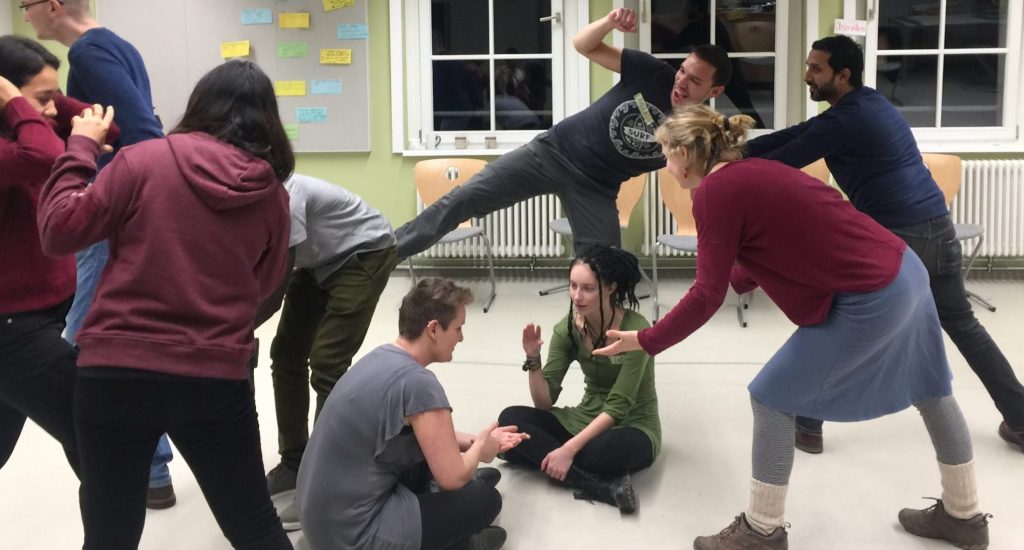This training is designed to equip students with tools and experiences for understanding intercultural relationships better, while providing them with a transformative team-building experience. Through a combination of theoretical input, embodied exercises and communication methods, participants have a change to connect deeply with each other and themselves, while learning about inter-group dynamics. The workshop offers a safe and playful environment to discover intercultural communication using “Image Theatre” and “Forum Theatre”. These transformative methods take students’ own experiences as a starting point, and offer a place where their stories can be shared and reflected upon. Concepts such as culture shock, stereotype, prejudice and discrimination are explored, while tools such as active listening and other communication skills are introduced. The overall aim of the workshop is to offer insight and tools on communication and interculturality for students to take into their daily life. At the same time, it is about having fun together by engaging with body, mind and heart.
|
Who is it for Bachelor, Master and PhD students from international study programmes. Duration of the training 2-day workshop: Covers the foundations of cultural sensitivity and cross-cultural communication. 3-day workshop: Covers the foundations of cultural sensitivity and cross-cultural communication, as well as a “practice-lab” day in which participants get to re-create intercultural misunderstandings and problem-solve together (forum theatre). The training can be conducted as two/three consecutive days, or on several days within a month. Other logistical details Group size should be between 15 and 25 participants. |
By the end of the course, participants should be able to:
- Define intercultural communication and identify the benefits of intercultural competences
- Understand basic concepts and mechanics of culture such as cultural standards, stereotypes, prejudice and discrimination.
- Understand communication models and how these affect intercultural relations
- Identify barriers to intercultural communication
- Identify mechanics of othering in real-life situations
- Discern between judgement and observation
- Understand the role of emotions in intercultural communication problems
- Implement strategies to improve intercultural communication skills
Topics that will be covered include:
- An interactive exploration of what culture is and some definitions
- The cultural iceberg
- Cultural Standards
- Culture shock
- Definitions of stereotype, and prejudice, discrimination
- The mechanics of othering
- Situations of intercultural misunderstandings
- Discussion of what communication is and theoretical models
- Verbal and non-verbal communication
- Discerning between judgement and observation
- Active listening exercises
- Exploring real-life situations through “Image Theatre” (day 2)
- A “Forum theatre” experience to collectively explore participants’ real life experiences of intercultural communication issues and practice their new skills (only on Day 3)
- An overview of intercultural communication competences
The workshop uses a combination of theory with embodied methods to provide a profound transformative experience for students. Delivery formats include:
- Power point presentations
- Group discussions
- Interactive exercises and games
- Work in pairs
- Image theatre
- Forum theatre
“The question I personally wanted to answer in this workshop was “How can I be task oriented and efficient without hurting people from different backgrounds and culture with whom I work with?” At the end of the workshop, I felt very happy that I have acquired the necessary tools to address or overcome this difficulty I often encounter. I just wish more students could benefit from this workshop, thus I hope more events of this nature will be organized in the future.”
